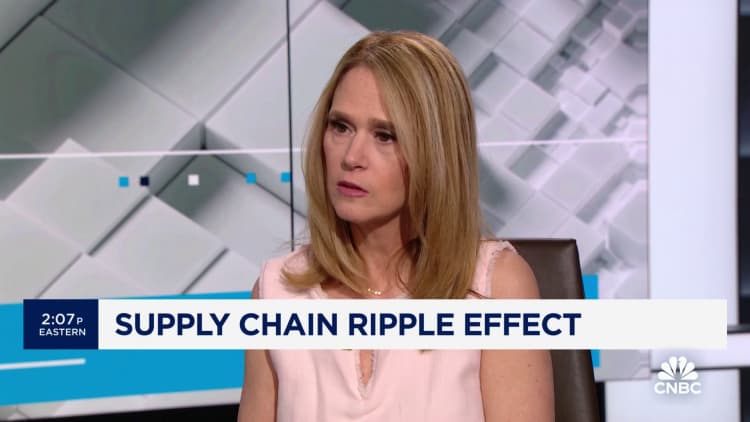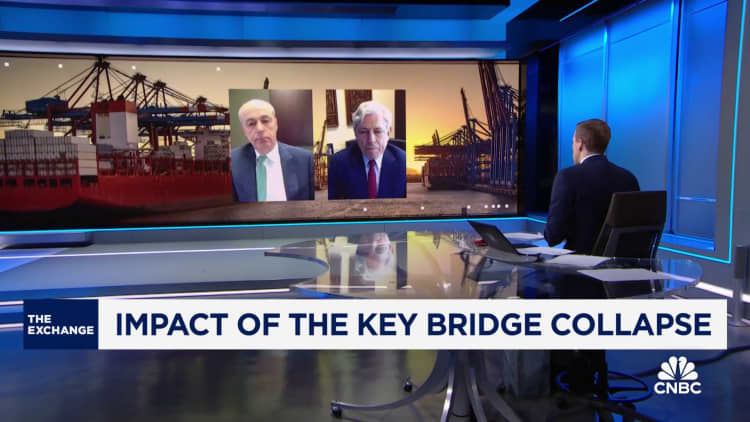
MSC, the world’s largest shipping company, has joined the list of shipping companies that have stopped delivering containers diverted out of port to shipping customers following a container ship crash near the Port of Baltimore that led to the tragic collapse of the bridge. With the Port of Baltimore closed indefinitely, the decision places the burden on the shipper to pick up the cargo at a rerouted port and transport it to its final destination.
In an email to customers obtained by CNBC on Thursday, MSC explained that for customer containers already at sea bound for the Port of Baltimore, the cargo will be rerouted and offloaded at an alternate port where it will be made available for pickup.
“For these shipments, the contract of carriage will be declared terminated at this alternative port and depot, D&D and transportation costs to the initially intended destination will be the sole responsibility of the cargo,” the MSC notice reads.
MSC added that “transition to and from Baltimore is at this time impossible and will not be reestablished for several weeks if not months.”
CMA CGM, COSCO and Evergreen were the first carriers to announce similar moves and in some cases to formally declare “force majeure,” a legal term that refers to the right to waive contractual obligations when events beyond the control of one of the parties.
MSC said in its communication to customers that it “apologies for the disruption caused by this contingency plan which is necessary in response to events beyond our control, but which is adopted in accordance with the terms of the contract of carriage” .
MSC did not immediately respond to CNBC’s request for comment.
Maersk is the only major carrier to say it will provide freight from diverted ports for customers.
Maersk was the charterer of the Dali, a 10,000-container container ship that lost control and crashed into the Francis Scott Key Bridge in the early hours of Tuesday.
Logistics companies have scrambled since the accident to come up with alternative transportation plans and keep up with carrier diversions, and executives told CNBC on Wednesday that the next few days will be crucial in moving the diverted traffic away from the Port of Baltimore.
The Port of Baltimore, the 11th largest port in the nation, is No. 1 in the United States for imports and exports of automobiles/light trucks and agricultural tractors, as well as the handling of clothing, household goods, construction materials, electronics and household appliances and agricultural products.
Among the unresolved issues, logistics executives cited ocean carriers not updating their ships’ transits quickly enough to alert them to the newly rerouted port so they can schedule the pickup of their customers’ containers.
Major ports up and down the East Coast, including Savannah, Brunswick, Virginia, Charleston and New York/New Jersey, as well as companies that provide rail and truck chassis, told CNBC they have the capacity to increase operations to meet the needs of incoming cargo.
In a series of updates, MSC sent a list of 23 ships arriving at diverted ports from March 28 to April 29. Eight have an unknown diverted port, 11 are bound for the Port of New York/New Jersey; three in Norfolk; and one in Philadelphia.
On Thursday, Transportation Secretary Pete Buttigieg had a meeting with supply chain professionals about the crisis and how to mitigate any congestion. The meeting was attended by the shipping companies CMA CGM, Maersk, MSC, Evergreen and the railways CSX and Norfolk Southern. Also present were the Port of New York/New Jersey, Georgia, Baltimore, Philadelphia, Jacksonville, South Carolina and Virginia. Freight forwarding customers at the meeting included John Deere, Stellantis, Home Depot, Under Armor and Volkswagen.
“We are much better equipped to mitigate supply chain disruptions than we were just a few years ago, thanks to greater coordination across the supply chain and new efforts to strengthen both our physical and digital infrastructure,” Buttigieg said, according to a reading of the meeting.
National Economic Advisor Lael Brainard, also present, noted that in previous disruptions, the lack of comprehensive information between different private sector and public sector components has hindered decision-making capabilities and responses. He cited the recent DOT FLOW initiative as making a difference. “It has already been activated to bring the full capacity of all federal government agencies to ensure that we are helping ocean carriers, port leaders, railroads, shippers and unions come together to assess potential supply chain impacts and then work together to address them.”
Paul Brashier, vice president of drayage and intermodal at ITS Logistics, said the biggest challenges may be experienced by smaller companies that coordinate bookings themselves and may not have relationships with these diverted ports. “You want to get your diverted container out of port as soon as possible so you don’t incur detention and demurrage fees. For some of these shippers they’re starting from scratch,” Brashier said.
Once a container arrives at the terminal, the clock begins ticking based on the free time allocated to a container. Once the free time expires, detention and demurrage charges begin, unless ports agree to waive them.
“We’re looking to see if the terminals will give an extension of time off or waive fees,” Brashier told CNBC on Wednesday. “That’s the problem now.”
